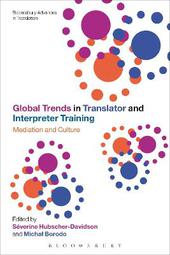
|
Global Trends in Translator and Interpreter Training: Mediation and Culture
Paperback / softback
Main Details
| Title |
Global Trends in Translator and Interpreter Training: Mediation and Culture
|
| Authors and Contributors |
Edited by Severine Hubscher-Davidson
|
|
Edited by Dr Michal Borodo
|
| Series | Bloomsbury Advances in Translation |
|---|
| Physical Properties |
| Format:Paperback / softback | | Pages:288 | | Dimensions(mm): Height 234,Width 156 |
|
| ISBN/Barcode |
9781472529909
|
| Classifications | Dewey:418.020711 |
|---|
| Audience | | Postgraduate, Research & Scholarly | | Professional & Vocational | |
|---|
|
Publishing Details |
| Publisher |
Bloomsbury Publishing PLC
|
| Imprint |
Bloomsbury Academic
|
| Publication Date |
16 January 2014 |
| Publication Country |
United Kingdom
|
Description
This book looks at translator and interpreter training, focusing on mediation and culture in a global context. It updates numerous research currents in translator and interpreter education by situating them in relation to broader curricular and technological discussions. Particular attention is given to the way in which translator and interpreter training relates both to other topics on university curricula, and to recent developments in the professional sphere of language mediation. These include the new European standard for translation services and the ethical training of interpreters. The significant impact of new technologies in translation is also studied. These discussions take place in the context of an increasingly mature and sophisticated theoretical environment of translator and interpreter training research, one which recognizes the implications of discourses such as constructivism and objectives-oriented design for new pedagogies in the field.
Author Biography
Severine Hubscher-Davidson is Lecturer in Translation Studies in the School of Languages and Social Sciences, Aston University, UK. Michal Borodo is Assistant Professor in the Institute of Modern Languages and Applied Linguistics at Kazimierz Wielki University, Poland.
ReviewsMy joy and exuberance are insurmountable when I find accessible, original scholarship that empowers me in my practice, research, and teaching. [This book] include[s] the kind of scholarship that serves this purpose ... [It] will appeal to interpreters, service providers, researchers, educators, and any reader interested in interpreting and translation services and studies. * Translation and Interpreting Studies * Stimulating reading! This innovative and thought-provoking collection of articles, by authors with their finger on the pulse of recent translator and interpreter training trends, tackles salient issues, addressing fundamental questions through well-informed studies in the field. -- Catherine Way, Faculty of Translation and Interpreting, University of Granada, Spain This volume offers a fascinating view of the rich tapestry that is contemporary translator education. The studies covered move from micro-level investigations of students' translation strategies to macro-level interrogations of the ideologies that inform translation curricula. Drawing on educational, technological and ideological approaches, amongst others, it presents a picture of an area in flux, where trans-national standardization and local exigencies come up against each other, and received wisdom is - or should be - constantly questioned. -- Dr Dorothy Kenny, School of Applied Language and Intercultural Studies, Dublin City University, Ireland In an increasingly globalized but also splintered world, translator training is absolutely vital. Therefore, Global Trends in Translator and Interpreter Training edited by Severine Hubscher-Davidson and Michal Borodo is a most timely publication. It comprises chapters by a selection of international authors which offer practically-oriented proposals firmly grounded in state-of-the-art IT technologies, in rapidly changing needs and expectations of young translation adepts and in burgeoning 21st-centurytranslation theory, to embrace such issues as intercultural communication,greater empowerment of translators and their increasingly exacting ethical commitments. Any teacher or student engaged in academic translator training programmes would be well advised to read this book. -- Professor Wojciech Kubinski, Faculty of Languages, University of Gdansk, Poland
|